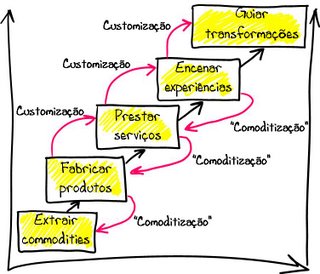No final do e-mail vinha a frase:
"Fica para outra altura a reflexão sobre o realismo de estratégias de subida na escala de valor em negócios B2B. Parece-me que isso é mais fácil em negócios B2C."
A frase acompanhou-me durante todo o dia de ontem.
.
De manhã, durante a subida da A25, pensava no quão perigosa pode ser... porque pode ser uma profecia que se auto-realiza. Se acredito que não é realista, já deixou de ser realista.
.
É fácil? Claro que não!
.
Ao final do dia, em conversa de despedida com o gestor de topo de uma empresa, ele contava-me um episódio do dia. Recebeu visita de fornecedor, conceituada marca de prestação de serviços, e disse-lhe algo como:
- Não me venham oferecer o mesmo que os outros. Vocês não têm preço para isso. Ofereçam-me este serviço X e este serviço Y. Não há ninguém no mercado a oferecê-los neste momento e, mais um ano ou dois e vou precisar de gente competente nessas áreas.
Commodities versus diferenciação.
.
Na viagem de regresso, a descer a A25, houve uma imagem de
2006 que surgiu:
Por que é que é difícil subir na escala de valor?
.
Porque, nos negócios, aquilo que é verdade hoje, amanhã é mentira! Aquilo que ontem era novidade, hoje é corriqueiro e amanhã será nota de rodapé.
.
Quantas empresas estão disposta a investir de forma permanente nesta busca incessante?
.
Disposta a investir em si e, dispostas a investir na descoberta e sedução dos clientes que valorizam algo mais do que o comum do mercado?
.
No escritório, tenho 4 ou 5 caixas que foram para sapatos, onde guardo relíquias do passado - peças de telemóvel, moleskines preenchidos, relógios avariados, ... - uma caixa é uma caixa ponto. Há dias, visitei uma empresa que fabrica caixas. Uma caixa é um produto funcional, serve para transportar sapatos. Até que no final da visita fui presenteado com uma caixa... nunca mais verei uma caixa da mesma maneira. Uma caixa fora da caixa!!!
.
Por alguma razão se exportam cada vez mais caixas vazias e montadas... porque têm muito valor acrescentado. São para o cliente clássico? Não!
.
Não é fácil, mas é realista, muito realista.




%2006.21.jpeg)












